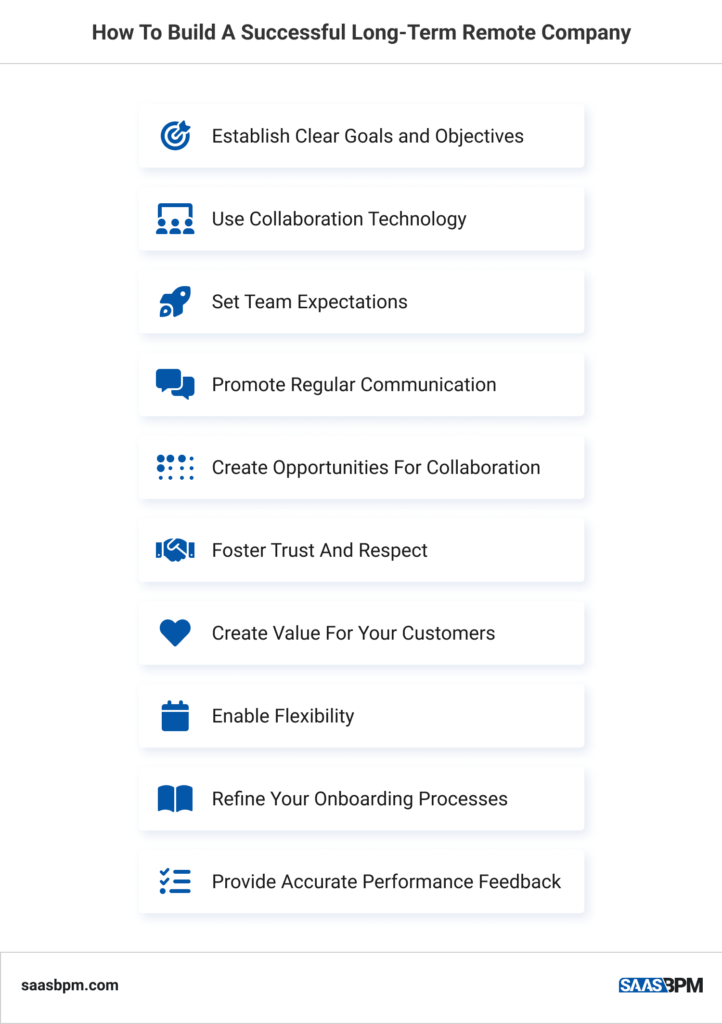As working from home is becoming increasingly popular, many companies have been shifting to operating as remote businesses. This model comes with its own set of challenges and opportunities, but also allows for a more agile and diverse workforce. In this article, we will discuss 10 strategies to ensure a successful long-term remote company.
Remote businesses can face several roadblocks due to miscommunication and the lack of physical presence. Yet by following certain core principles, many successful remote companies are thriving in today’s market. From fostering and encouraging team collaboration to providing proper onboarding processes, some strategies can help make a remote company thrive long-term.
To gain insight into these practices that successful remote companies apply daily, let’s dive into 10 strategies for a successful long-term remote company.

1. Establish Clear Goals and Objectives
The first strategy for a successful long-term remote company is to establish clear goals and objectives that you want your team members to strive towards. Developing key performance indicators (KPIs) or using other metrics will help track progress towards those goals, while setting expectations for everyone involved about what success looks like.
It is also important for managers and leaders to focus on developing a culture of transparency within their teams so everyone understands how their efforts are contributing towards the greater good of the organization.
2. Equip Your Team With the Necessary Technology
One of the biggest challenges of running a remote business is ensuring each team member has access to the necessary tools they need in order to do their jobs effectively. Providing appropriate technology such as computers or laptops, applications for communication and collaboration like Slack or Zoom, as well as project management software like Asana can help streamline business process management. This way everyone’s needs will be met when it comes time to complete tasks or projects.
3. Set Team Expectations
If you want to future-proof your remote company, carefully set expectations with your team members from the start on both individual performance levels as well as collective goals. For example, establishing deadlines for task completion or creating specific job descriptions detailing what roles each team member plays can be effective in facilitating communication amongst all parties involved in any given project or task.
Additionally, agree upon working hours beforehand so there are no misunderstandings about when someone should be available online. This can help provide an extra layer of clarity throughout your entire operation process which leads us right into our next point…
4. Promote Regular Communication

In order for any team to function properly, they must have open lines of communication that keep everyone connected regardless of geographical boundaries. Employing various tools such as weekly video calls or daily check-ins are great ways to build trust amongst team members while also keeping them informed about what’s happening across different departments within the company itself.
Having regular meetings where everyone updates one another on their progress helps reduce potential miscommunications that may arise due to distance when it comes time to present information verbally rather than writing out emails or text messages alone!
5. Create Opportunities For Collaboration
Successful teams learn how best utilize collaborative spaces within their operations whether it be through setting up group chats where ideas can be shared amongst multiple people at once or creating virtual whiteboards where diagrams can be sketched out quickly! Allowing your employees more freedom over how they choose work (within reason!) opens up opportunities for different perspectives.
6. Foster Trust And Respect

Any successful business relationship must be built off trust and respect between colleagues given how integral both qualities are in fostering productive conversations. This doesn’t necessarily mean every single perspective needs agreement. Prioritizing mutual understanding between each participant will allow feedback loops to remain constructive instead of devolving into personal attacks and potential tension in your team!
7. Keep Your Focus On Creating Value For Your Customers
No matter what industry you operate in, it’s essential with any long-term plan you put together to consider both customer satisfaction & loyalty. Don’t forget why you started down this path initially after all! Listening closely whenever customer feedback enters discussions makes sure your strategies remain relevant whilst remaining competitive against whatever competition might exist.
8. Enable Flexibility
To maintain morale throughout your entire organisation, enabling flexibility whenever possible goes far beyond simply allowing someone to take off early one Thursday afternoon. Offering flexible schedules allows workers to adjust whatever circumstances arise and better manage life balance responsibilities alongside professional commitments.
9. Refine Your Onboarding Processes
The onboarding process for a remote team should be engaging and effective. Establishing clear expectations from the start, such as when and how to communicate with leaders, will help new employees integrate quickly with the existing team. It is also important to provide an orientation program where they can learn about the company’s values and culture, as well as their tasks and goals. Additionally, providing access to helpful resources such as guides, tutorials, and videos can ensure that all new employees feel supported.
10. Provide Accurate Performance Feedback
Ensuring accurate performance feedback is essential in any workplace. There are various methods of collecting it, including surveys or meeting with individual team members regularly. This helps give leaders valuable insight into how employees are performing and facilitates conversations that lead to improving both individual and team performance over time. Consistently tracking performance data allows managers to identify potential areas for improvement to ensure a successful long-term remote business.
Wrapping Up
Implementing these 10 strategies for successful remote work can help a company make the most of their telecommuting arrangement. All too often, remote companies strive for success but do not have a plan in place to foster it. With the right goals, resources, and focus in mind, any organization can discover the effectiveness of having a long-term remote team. Transforming a business into an effective roster of distributed talent is no easy task, but with smart planning and dedication from all members of the team – including leadership – the goals set forth will become reality.

